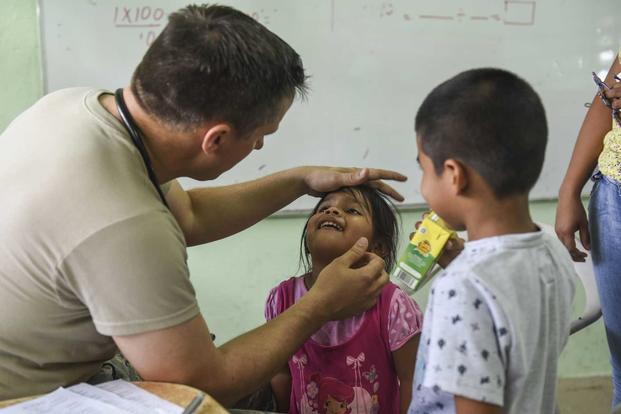Major problems, including not enough providers in Tricare's western region and slow claims processing in the eastern region, continue to plague the contractors responsible for administering the program, according to documents obtained this week by Military.com.
Humana and Health Net took over the Tricare program in the U.S. eastern and western regions respectively Jan. 1, even as the system rolled out a series of unrelated congressionally mandated changes that restructured plans and raised fees.
But the pair immediately ran into major snags, ranging from frustrating to comical. Nationwide, an administrative blackout period in December, put in place for system updates, sparked enrollment and claims backlogs and lost payment updates for many users.
In the east, Humana sent a series of contradictory update letters to military retirees and became buried under a claims backlog. It also rolled out an 800 number one digit removed from what appeared to be a sex hotline. In the west, Health Net faced a lack of network providers, dramatically inaccurate provider listings on its website and overwhelming call volume resulting in long wait times.
While some of those problems have been largely resolved in the last nine months, many persist, according to Defense Health Agency (DHA) briefing documents prepared earlier this month by military advocacy organizations and obtained by Military.com.
The biggest problems sit with Health Net in the western region, according to the documents. Although Health Net is required by contract to have an accurate provider directory, DHA officials report the directory is currently only correct for about 25 percent of the western region. That means 75 percent of users are seeing incorrect provider listings. In some cases, no providers are listed for their area when some actually are available.
And as of last August, Health Net was still short 503 primary-care providers and specialists in 12 regional areas it had identified to first focus provider network efforts, the documents show.
Officials with Health Net did not respond by deadline to a Military.com request for comment.
Meanwhile, in Tricare's eastern region, Humana continues to face problems with claims processing time.
The DHA examines how provider claims are processed through a series of eight metrics, including processing times and accuracy. Humana is currently under the standard, or "red," in four of those categories. For example, the contractors are required to reprocess just over 95 percent of error claims within 130 days. But according to the documents, Humana is currently meeting that 130-day benchmark in only about 70 percent of cases.
Still, there is hope for improvement soon, the documents noted. For example, changes in Humana's subcontracting are projected to erase the remaining claims backlog by the end of the month.
"The Tricare contract transition at the beginning of the year brought challenges for our beneficiaries and providers," Robert Bertrand, a Humana spokesman, said in a statement. "Since then, we have implemented operational changes and seen steady improvement in our performance metrics."
For Kathy Beasley, a Military Officers Association of America deputy director of government relations who works on Tricare issues, the fixes in both the east and west regions cannot come fast enough.
"We've been closely following and tracing these things, and we're starting to lose a little bit of patience. It seems like over and over it's the same stuff," she said.
Beasley said MOAA is continuing to work with the DHA, Humana and Health Net to communicate Tricare problems flagged by the organization's members. Still, she said, MOAA officials hope to see more substantial changes soon.
"We're coming up to a year very shortly," she said. "How much longer are we are going to be looking at these red metrics and have to be worried about contract compliance in some of these key areas?"
-- Amy Bushatz can be reached at amy.bushatz@military.com.











